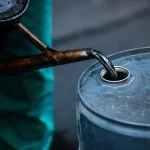The Ghana Private Road Transport Union (GPRTU) says its members are not benefiting from the Gold for Oil policy implemented by the government to mitigate the high depreciation of the Cedi.
The Public Relations Officer (PRO) of GPRTU, Samuel Amoah, said how the government hyped the policy raised their expectations of a reduction in fuel prices.
However, he said their hopes were dashed after the programme was rolled out.
“What we are seeing now is not what we were expecting. Because, if you check on the pump right now, the diesel to the petrol prices is still around 14.5, 14.9 thereabout, hitting 15 cedis per litre. Where it is now will not push us, the transporters, to also think of reducing our fares.”
“As it stands now, our expectations are not being met,” Mr Amoah complained.
He admitted that although there has been a slight reduction in fuel prices, it is still not enough to compel the union to reduce transport fares.
“We are thinking that by this time, the fuel prices will come down to the level that transporters can also think about reducing their transport fares,” he stated.
Mr Amoah further added that the GPRTU would consider transport fare reduction if the fuel prices decline to GH¢11.3.
Meanwhile, the second consignment of petroleum products that have arrived in the country under the Government’s Gold for Oil programme will be sold to Oil Marketing Companies (OMCs) with no less than 45 outlets across the country.
The National Petroleum Authority (NPA) said the decision would ensure that consumers felt the impact of the programme in terms of reduction in prices of petrol and diesel at the pumps.
The government announced the Gold for Oil Policy in November last year as an innovative way to exchange gold for petroleum products instead of US Dollars.
The government said the move was intended to reduce the demand for dollars for the importation of petroleum products and, by extension, reduce the rate of depreciation of the Cedi.
















